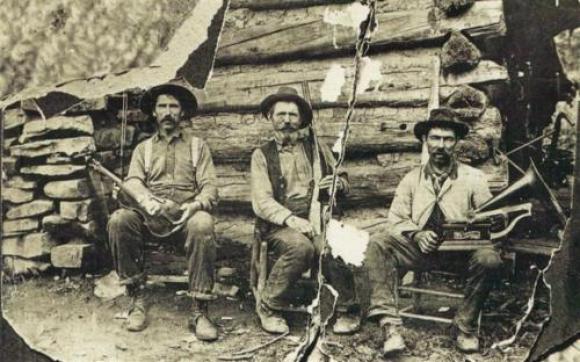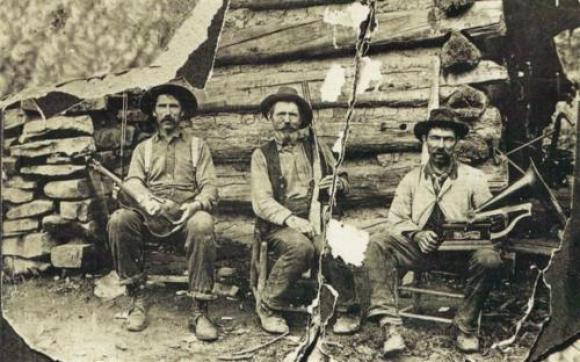
Why do Southerners continue to fall into that trap where we only talk about the years1861-1865? There are almost 400 years of Southern culture to talk about, yet we keep limiting ourselves to just four of them. And it doesn’t matter how much of an expert someone becomes about Fredericksburg, Yankees will always have that same ace-in-the-hole comeback, “You lost.” But music is different. Music is a decisive cultural venue where Yankees simply don’t stand a chance.
It would be notable enough if the South contributed maybe four or five significant genres of American music – but we contributed almost ALL of them! American music has a Southern accent, because practically all of American music is Southern in both origin and identity. Any identifiable American musical sound that’s known around the world is actually a Southern sound, and whenever people talk about American music, they’re actually talking about Southern music.
Creating a list of genres of American music that comes from the South is basically the same thing as creating a list of American music. Blues, ragtime, boogie-woogie, Dixieland,jazz, swing, country, honky-tonk, outlaw, rhythm & blues, rockabilly, rock‘n roll, bluegrass, western swing, coal mining, Appalachian, sacred harp, spiritual,gospel, barbershop, soul, funk, Gullah, Carolina shag, swamp rock, southern rock, Chicano rock, death metal, dirty south, parrot head, Tejano, creole,Cajun, zydeco, etc. All of those genres are unique to the South, and were created using authentic Southern ingredients. They didn’t “pass through”Dixie. They were all born in Dixie. Additionally, those genres literally couldn’t have come from anyplace else.
Southern music is like a big bowl of gumbo. Dixieland is a mixture of creole and Southern African-American music. Rock ‘n roll is a mixture of country and rhythm & blues. Soul is a mixture of rock ‘n roll and gospel. Western swing is a mixture of country and jazz. So, not only are the genres uniquely Southern, the very ingredients from which they are compiled are also uniquely Southern.
A Progressive might scan the list of Southern musical genres and object to its accuracy because examples of so-called “black music” and “white music” were included together. However, instead of seeing it only as a black vs white thing, Southerners recognize it as “Southern,”and not black or white. The same problem arises when a non-Southerners sees a plate of black-eyed peas and cornbread,and calls it, “soul food.” Southerners know that a plate of food like that is correctly called “Southern food,” not“soul food.” Therefore, in the South,the historically and culturally correct label for the music is “Southern music,”and not black or white music.
Southern music may very well be the undiscovered mother lode that we’ve all been seeking to help explain Southern culture to the non-Southerners. It might just be our elusive magic bullet. Southern music allows you to build relationships with people who are long gone, but still communicating.
Music has a magical ability to transport the listener directly into the mental state of the musicians, both performers and composers. You don’t just learn what they know, but you get to feel what they feel. Literature can’t exactly do that,because the writer is going to be necessarily literate. High-quality music frequently comes from the illiterate, the uneducated, and the unsophisticated. Also, music is a performance art, and is able to communicate more effectively than painting or literature. Every time a piece of music is performed,it’s rewritten, re-edited, and reinterpreted, and that becomes a HUGE advantage for Southern culture. Through ongoing performances of Southern music, people all over the world get to build contemporary relationships with our ancestors, and not just the selected,celebrated, historically important ancestors, but ALL of them. This includes the aforementioned illiterate, uneducated, unsophisticated, good, evil, profound,profane, black, and white Southern musician.
Southern music is a direct backdoor entrance to raw, authentic Southern culture without having to go through any filtered Yankee nonsense. “Come on in, y’all, thedoor’s open. Help yourself. This is what it’s like to be born and raised on a farm in Alabama. And this is what it’s like to work in a coal mine in Kentucky. And this is what it’s like to be so lonesome I could cry.”
I believe that the most significant difference between the South and the rest of the country is that in the South, although groups of people may not get along with each other and may clash and have their differences, frequently the people within the groups get along fine. They know each other, they work together, go to church together, and they’re neighbors. They have built relationships with each other, and they see eye-to-eye on a lot of face-to-face issues, and they are rightfully happy with that arrangement. However, outside the South, that situation is exactly reversed. Although groups of people may be technically cooperative, the individuals within the groups don’t have anything to do with each other. I like our way better.
Relationships are some of the most important things created in life, and that is the key to understanding Southern music. Southern music was not created by committee, or by decree, or by a government. It was created by individual people building relationships with each other, cooperating and collaborating with each other,learning from each other, and having a good time. Ultimately, that is also the key to understanding all of Southern culture.






